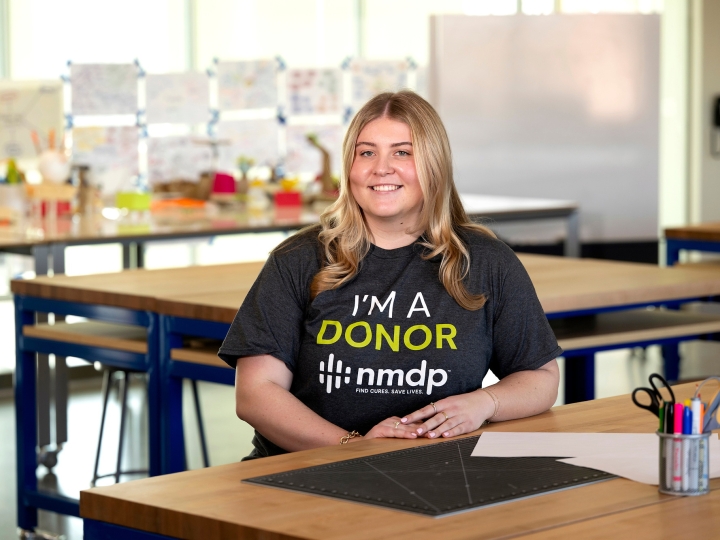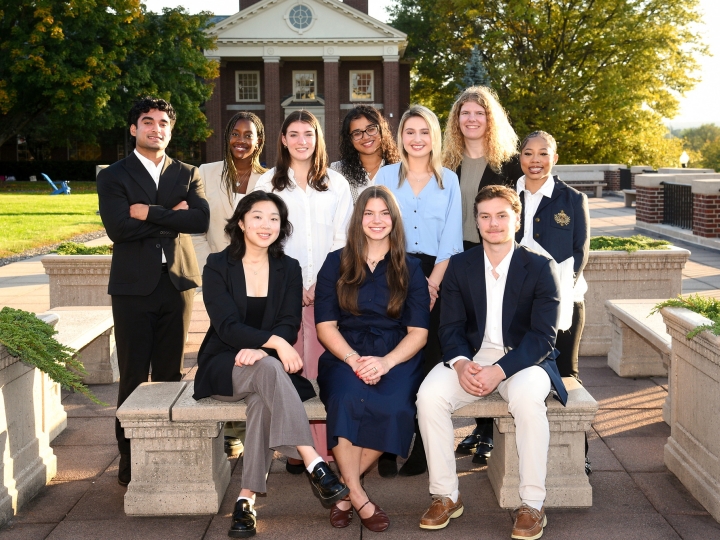With New Grant, Bucknell Expands Research for Women in Science
January 3, 2018
As Rileigh Casebolt '18 looked over the peaks and valleys of the graph, the results of an experiment she designed, a huge smile spread across her face. "It worked! On the first try!" the senior chemical engineering major shared with the other students in the Rooke Chemistry lab late on a Wednesday afternoon, beaming at her accomplishment.
A presidential fellow who has done research since her first year at Bucknell, Casebolt had set up the experiment to detect carbon monoxide and carbon dioxide in emissions from e-cigarettes — a wide-open area of inquiry that her advisers (professors Tim Raymond, chemical engineering and Dabrina Dutcher, chemistry and chemical engineering) have been investigating since the devices became popular a few years ago. Her experiment appeared to have found carbon monoxide in those emissions — a significant accomplishment if confirmed and one that's already offered Casebolt a powerful educational experience.
"I've had previous experiments that didn't work on the first try, so this was a huge deal and means a lot to me," said Casebolt. "It's more significant than a classroom lab, where you know you're going get certain results."
Thanks to a new grant from the Clare Boothe Luce Program of the Henry Luce Foundation, even more students like Casebolt — women majoring in traditionally male-dominated science, math and engineering fields — will soon have the opportunity to take part in these transformative Bucknell learning experiences.
The $216,000 grant will enable Bucknell to offer up to 24 new stipends to students for pursuing research projects alongside professors over the next three summers, all targeting women majoring in 11 engineering, math and physical science disciplines where they currently comprise less than half (between 17 and 47 percent) of enrolled majors. Bucknell will match those efforts with 12 additional research stipends and rent-free housing allowances. Professors Karen Castle and Wendelin Wright, who have both previously been named Clare Booth Luce Professors by the program, applied for the grant on behalf of the University.
A High-impact Exercise
Research experiences like Casebolt's are "one of the best high-impact activities we have," said Castle, professor of chemistry and associate dean of the faculty for natural sciences & mathematics. "Participating in research projects can change the course of our students' lives," she continued. "It helps them see what it's like to be a scientist or an engineer and what their future could look like and it's something we do exceptionally well at Bucknell."
Summer research allows students to remain on campus for eight to 10 weeks to pursue scholarly and creative projects alongside faculty mentors. Students in any major may apply for stipends from a variety of University sources for any summer prior to their graduation. The Luce grant will provide stipends of $5,000 to support undergraduate researchers during a 10-week research window, as well as additional funds for purchasing research supplies and travel.
"I think summers are the best time to do work on Bucknell's campus," said Abby Kreznor '18, a chemistry major who started doing scientific research through the STEM Scholars program before her first semester had even begun. "You can focus on what you're doing all day long. You don't have any classes or other obligations to take care of — you can just be in there and do what you're really passionate about."
Building on Past Success
The research program will build on a series of successful efforts to recruit and support women in the physical sciences and engineering that have made Bucknell a leader in the field — Bucknell ranked 13th in the nation in the percentage of engineering bachelor's degrees awarded to women in 2016 (36.5 percent, versus 20.8 percent nationally), according to an American Society for Engineering Education report. Women also comprise around 35 percent of physical science majors at Bucknell, an increase of nearly 10 percent since 2006, when they comprised 27 percent.
A 2008 grant from the Clare Boothe Luce Program, one of the most significant private supporters of women students in science and engineering in the United States, provided scholarships for 20 Bucknell women to study engineering over a five-year span, with the last recipients graduating in 2016. It was one of several programs, such as the Engineering Success Alliance and STEM Scholars, that support members of traditionally underrepresented groups in science and engineering fields, including women in male-dominated disciplines.
The Luce Program provides funding to encourage women to enter, study, graduate and teach in science, mathematics and engineering. Clare Boothe Luce was a playwright, journalist, U.S. ambassador to Italy and the first woman elected to Congress from Connecticut.
Role models are critical to success in a field where most people don't look like you, said Wright, a professor of mechanical engineering and chemical engineering, noting that she never took a class from a female full professor while studying for her bachelor's, master's or doctoral degrees at Stanford University. "I did feel supported by the male faculty, but when I got to my profession, it was very hard to see what was ahead and how to get there," she said.
To that end, Bucknell has also taken recent, deliberate steps to increase diversity among its faculty. Over the last decade, it has raised the number of female professors in STEM fields, moving from 26 to 31 percent in physical sciences and from 18 to 26 percent in engineering. Clubs such as the Bucknell Society for Women Engineers and the Association for Computing Machinery-Women, meanwhile, offer undergraduate engineers and scientists mentorship and support from senior classmates.
Wright and Castle are also designing the Luce summer-research program as a cohort model — in which grant-funded students will take part in common activities — to provide peer support and broaden the impact of the grant.
"We're hoping to invite more women into the cohort by having them participate with existing Bucknell programs," Castle said. "We may have a student who's being funded through the Program for Undergraduate Research, for example, but we will invite her to all of the programming we do with our scholars. We're hoping that the impacts of the program are bigger than just the students who are actually supported by the funding."
Additional funding from the Luce grant will also support students presenting their results at off-site academic conferences or visiting graduate schools — important aspects of professional development for scientists, Wright noted.
"One goal that we have is that some of these women will pursue graduate school," Wright said. "If we think that the numbers aren't good in college, it's actually worse in graduate school and even worse in the faculty ranks nationally. So showing these women that a graduate career is a viable path will be very exciting too."

